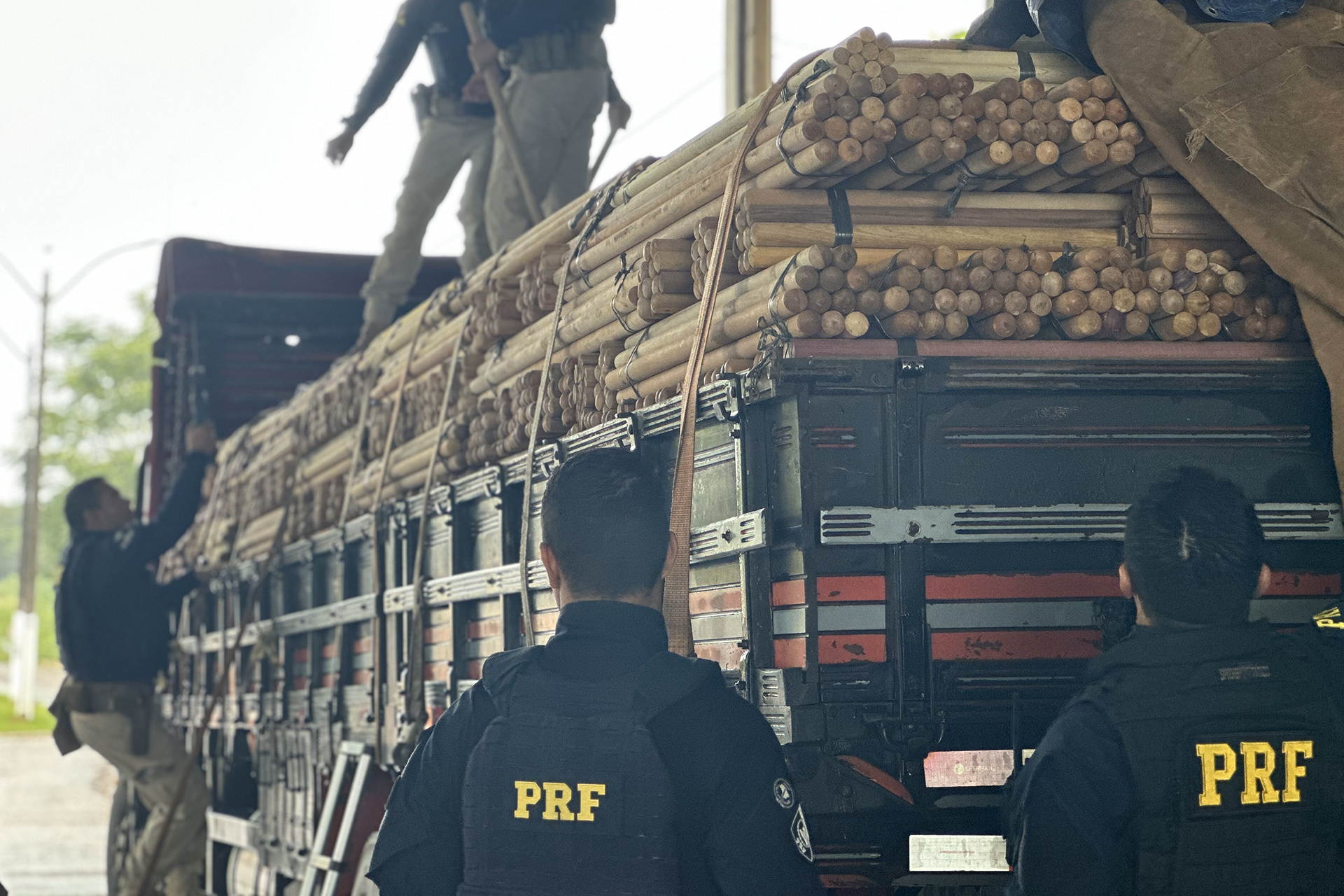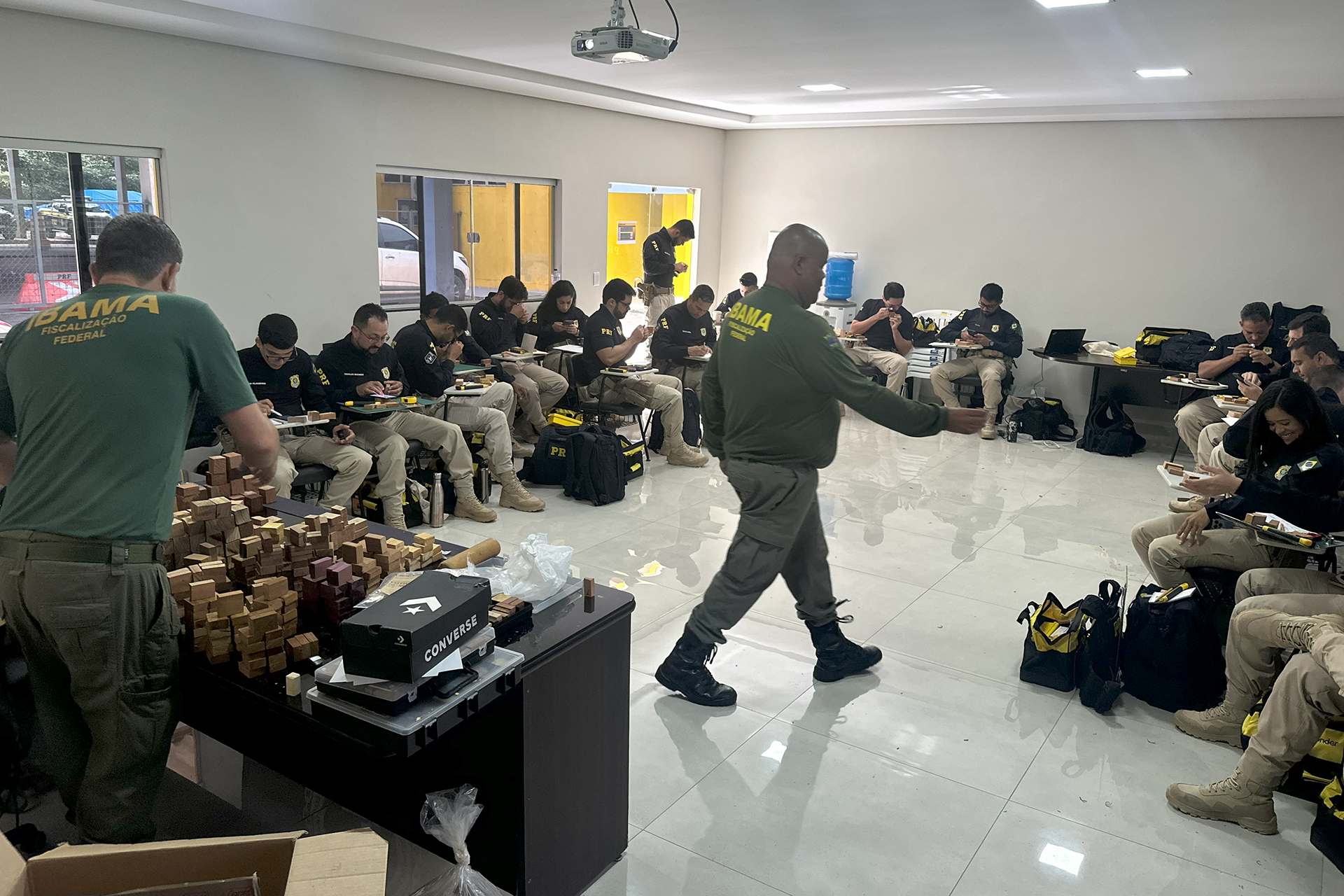
Pictures: SECAM/PRF
Ji-Paraná, Brazil, 12 April 2024 – The Federal Highway Police (PRF) seized 135 m³ of illegal timber during the Third Training in Macroscopic Identification of Wood Species (NIMEM), held in Ji-Paraná, Rondonia. The inspection activity, which began on April 7 and ended on Wednesday (10), was held in the days after a training course for 20 PRF officers in anatomical identification of wood, promoted by the United Nations Office on Drugs and Crime (UNODC) in partnership with the Brazilian Institute of Environment and Renewable Natural Resources (IBAMA), and supported by the United States Bureau of International Narcotics and Law Enforcement Affairs (INL).
The objective of the training was to strengthen the inspection of forest product transportation in order to identify illegal loads and document fraud involving species of wood protected by environmental legislation.
The subsequent operation allowed the trained officers to consolidate the knowledge acquired during the training workshop in real inspection conditions. During the operation, 23 incidents of environmental crime were recorded, with 136 vehicles inspected and 27 people detained. In total, 135 m³ of illegal wood, 6.173 units of finished timber products, and 18 m³ of charcoal were confiscated. The seized timber and trucks have now been transferred to the custody of the Civil Police, who will continue the investigation of the cases.
Training
The course that preceded the operation was held between 1 and 5, also in Ji-Paraná, and included PRF officers from Rondonia, Para, Sergipe, Pernambuco, Rio Grande do Norte, Rio Grande do Sul and the Federal District. Representatives of the Rondonia State Court of Justice (TJ-RO) and the Rondonia Public Prosecutor's Office (MP-RO) also attended.
Pictures: SECAM/PRF
Ji-Paraná, Brazil, 12 April 2024 – The Federal Highway Police (PRF) seized 135 m³ of illegal timber during the Third Training in Macroscopic Identification of Wood Species (NIMEM), held in Ji-Paraná, Rondonia. The inspection activity, which began on April 7 and ended on Wednesday (10), was held in the days after a training course for 20 PRF officers in anatomical identification of wood, promoted by the United Nations Office on Drugs and Crime (UNODC) in partnership with the Brazilian Institute of Environment and Renewable Natural Resources (IBAMA), and supported by the United States Bureau of International Narcotics and Law Enforcement Affairs (INL).
The objective of the training was to strengthen the inspection of forest product transportation in order to identify illegal loads and document fraud involving species of wood protected by environmental legislation.
The subsequent operation allowed the trained officers to consolidate the knowledge acquired during the training workshop in real inspection conditions. During the operation, 23 incidents of environmental crime were recorded, with 136 vehicles inspected and 27 people detained. In total, 135 m³ of illegal wood, 6.173 units of finished timber products, and 18 m³ of charcoal were confiscated. The seized timber and trucks have now been transferred to the custody of the Civil Police, who will continue the investigation of the cases.
Training
The course that preceded the operation was held between 1 and 5, also in Ji-Paraná, and included PRF officers from Rondonia, Para, Sergipe, Pernambuco, Rio Grande do Norte, Rio Grande do Sul and the Federal District. Representatives of the Rondonia State Court of Justice (TJ-RO) and the Rondonia Public Prosecutor's Office (MP-RO) also attended.

Alexander Walsh, Coordinator of UNODC Brazil’s Unit for the Prevention of Environmental Crime, emphasized the importance of the activity and the interinstitutional joint work. “Trainings like this are essential for improving the skills and knowledge of agents in the field, strengthening efforts to preserve natural resources and making inspection operations even more efficient, as demonstrated by the results achieved,” he highlighted.
Federal Highway Police officer Edivaldo Machado emphasized that the institution's role in the defense of the environment is part of its strategic map for 2023-2028. "With this training, Federal Highway Police officers are able to detect fraud related to species differences, i.e. when the species declared/authorized in the forestry document does not match the species actually transported," he explained.
According to Edevar Sovete, environmental analyst at IBAMA and one of the instructors, the institution's participation in the training helped to bring the agencies involved in enforcement activities closer together. "It's an opportunity to exchange experience and strengthen the fight against environmental crimes," he said.
During the training, participants were able to learn more about various aspects of inspecting the forest products production chain. The course covered topics such as nomenclature, vegetal anatomy, macroscopic characteristics, the preparation of technical reports and endangered species and/or species protected by legislation. Participants also carried out practical exercises to identify commercial timber, which served as preparation for the operation.
The PRF class that completed the training on Friday is the third of five workshops on macroscopic timber identification planned under project CRIMFLO – Strengthening the Criminal Justice System Response to Forestry Crimes, an initiative of the UNODC Global Program on Crimes that Affect the Environment (GPCAE).
A total of 100 professionals will be trained in wood identification techniques throughout 2024 under the framework of the CRIMFLO project. Officials from the Amazonas Environmental Protection Institute (IPAAM) and the Pará State Secretariat for the Environment and Sustainability (SEMAS-PA) have also taken part in the training, and in the second semester there will be two more sessions focused on officials from Ibama.